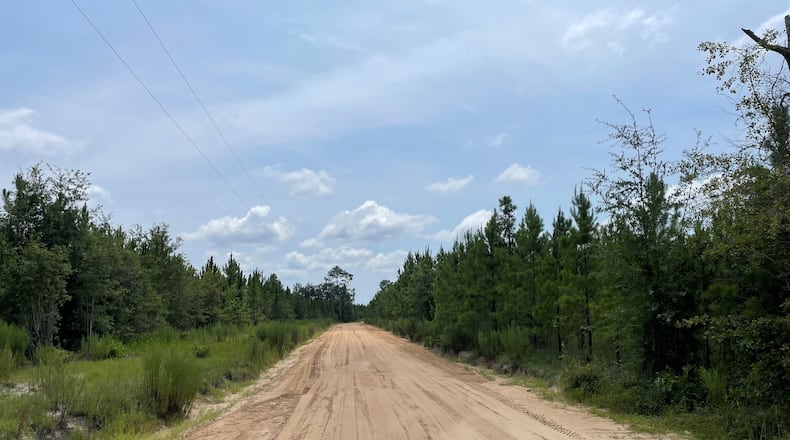ELLABELL, Ga. -- Take one of the sleepier exits on I-16 west of Savannah, head past a few greasy fast-food joints and gas stations and a cinderblock church until the paved road suddenly gives way to hard-packed dirt.
Then venture down dusty Tar City Road in Ellabell and you’ll get a glimpse of one of the state’s most important strategic investments. It’s about to be in a broader spotlight, with officials set to travel to the site Friday to announce one of the largest economic development projects in Georgia history.
The 2,284-acre “megasite” in Bryan County, a purchase announced in May 2021, was designed to compete with other large plots of land around the nation for game-changing economic development deals that could bring thousands of jobs to Georgia.
And The Atlanta Journal-Constitution reported last week the site will be the home of a Hyundai Motor Group factory that will employ thousands when all phases are complete.
Officials say as many as 7,500 workers will make both electric vehicles and batteries, and could eventually expand to conventional vehicles, though they stress final details are still being worked out.
State officials and Hyundai executives have declined to comment on the development. But Gov. Brian Kemp’s office on Wednesday alerted the media to a “special economic development” announcement on Friday at the Bryan County property.
The pursuit of the Hyundai plant is a culmination of a long-range strategy to lure an automaker — and the thousands of jobs it would generate — to Georgia.
For decades, Georgia’s only major victory on that front came in 2006, when a bounty of state and local tax breaks worth more than $400 million helped woo Kia to put a plant in West Point, 75 miles southwest of Atlanta.
Other efforts ended in heartbreak.
In 2002, under Gov. Roy Barnes, Georgia officials expected to win a Sprinter van facility at the Pooler megasite at I-16 and I-95 just outside Savannah. The state held a bash to announce the $750 million project, though representatives of the company were noticeably absent.
The van plant fizzled and eventually a smaller facility was built in neighboring South Carolina.
In 2015, Georgia swung for the fences for a Volvo factory. Then-Gov. Nathan Deal wanted it to be his signature economic development project, and he took a number of steps to sweeten the pot.
He persuaded Georgia lawmakers to make it easier for state agencies to buy Georgia-made cars and overhauled an environmental agency to clear the way.
His economic development team shuttled back and forth to Volvo’s home country of Sweden and Deal flew to New York to make a final pitch that centered on the Bryan County megasite.
The deal collapsed in the final hours when Volvo ultimately chose South Carolina, in part because of promises of expensive infrastructure improvements and encouraging reports from executives of a nearby BMW plant.
The state’s fortunes changed in December, when electric vehicle manufacturer Rivian unveiled plans to build a $5 billion factory at another megasite off I-20 about an hour east of Atlanta. Rivian plans to hire 7,500 staffers for the project, which involved a $1.5 billion package of local and state incentives.
In a bit of irony, Georgia’s Hyundai Motor win was born out of those years of losses.
Despite the unsuccessful Volvo recruitment, state officials saw the I-16 property as one with massive potential and executed a plan to gain outright control of the Bryan County site.
In recent years, officials carved up the Pooler megasite that had been pitched to Sprinter. Mitsubishi Power America operates a factory there. And a year ago, Amazon bought a portion for a warehouse operation.
State officials took about $62 million it generated from the sale to Amazon to help finance the purchase of the Bryan County land with a local joint development authority.
Soon Georgia will have its next auto factory.
Credit: Greg Bluestein
Credit: Greg Bluestein
About the Author
Keep Reading
The Latest
Featured




